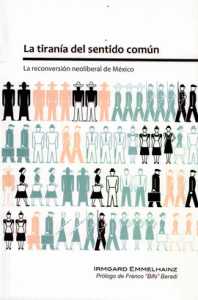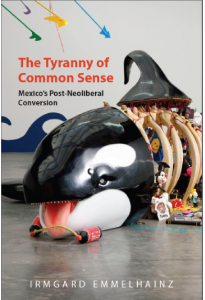Los mecanismos neoliberales se han convertido en sentido común que rigen todas las áreas de la vida, anclando nuevas formas de totalitarismo al enraizarse en la vida, la sensibilidad y la distribución de lo sensible. Así, el neoliberalismo rige la lógica de la vida, trabajo y subjetivación como formas de control social, como en la forma en la que la cultura y la producción de arte obedecen a la lógica del libre mercado para convertirse en escaparates de la democracia y vehículo de la sensibilidad neoliberal. También se observa cómo el imaginario colectivo está siendo transformado por la violencia en un espasmo de dolor comunitario, en la manera en que los movimientos sociales, a pesar de su intermitente ebullición, canalizan el descontento sin poder concretarse en instancias de organización política alternativas. Finalmente, el libro responde a cómo las formas neoliberales de administrar los cuerpos —específicamente de las mujeres— junto con el ideal de mujer emancipada del feminismo de la segunda ola, se transformó en un manual para navegar y reforzar el heteropatriarcado.
Encompass the developments of neoliberal common sense after Andrés Manuel López Obrador’s ascent to power, the implications of his “post-neoliberal” policies and the institution of a new hegemony. This book is an in-disciplinary exercise of critical thought anchored in neoliberal Mexico with a global perspective. My purpose is to elucidate the neoliberal mechanisms that work from within subjectivities and that have become common sense ruling all areas of life. Specifically, what I explore in this book are the ways in which urban planning in Mexico City is geared towards spatial segregation, differentiating, and homogenizing the different socio-economic classes, as well as the services and
commodities to which each strata of society has access to; the ways in which neoliberalism rules the logic of life, work and subjectivation as means of social control; how culture and art production have obeyed the logic of the free market to
become a showcase for democracy and vehicles for neoliberal sensibility that includes a twisted sense of empathy; how the collective imaginary has been transformed by violence into a shared suffering spasm, making urgent the emancipation of a moral vision of violence in order to enable the politicization of the collective toward anti-capitalist struggles. I also explore the ordeals of indigenous peoples in Mexico under the light of the intensification of extractivism and massive repression of territorial defense struggles. I also address the difficulties in representing these struggles due to the dissociation between urban (civil society) and originary populations’ ordeals and what I call the colonial blind spot.




